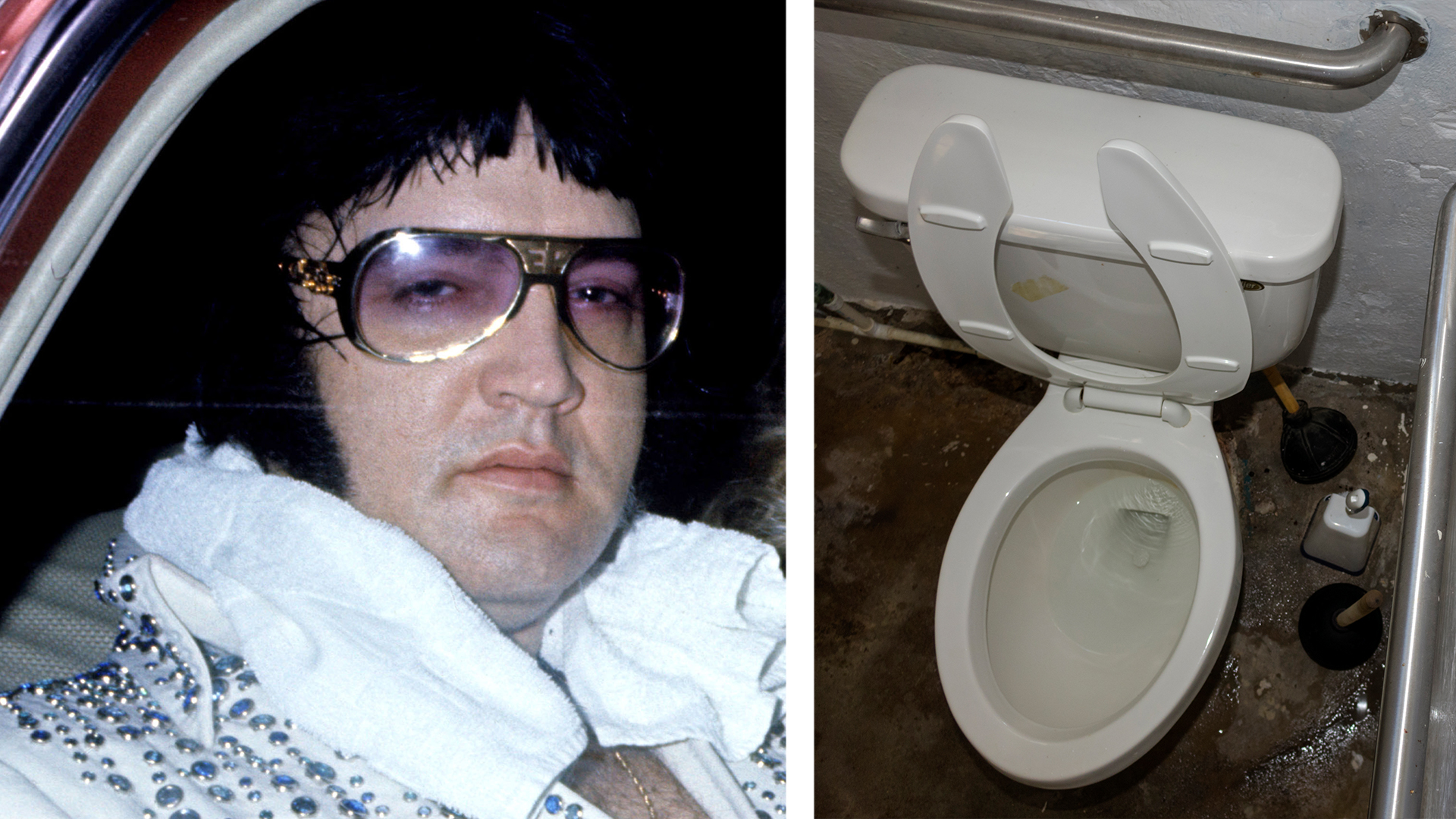Was the King's demise linked to a bathroom? Examining the circumstances surrounding Elvis Presley's death.
The assertion that Elvis Presley died in the bathroom, often accompanied by speculation regarding the specific location within the bathroom (e.g., on the toilet), is a persistent urban legend. A thorough examination of the factual record reveals that the circumstances surrounding his death were far more complex and tragic than such simplistic narratives suggest.
The significance of exploring this question lies in understanding the importance of accurate historical record and how rumors, fueled by rumour and speculation can distort the truth. This sort of examination is essential for respecting the deceased and maintaining a nuanced understanding of their legacy. The often-cited 'bathroom death' narrative is at odds with the verifiable details of the medical investigation.
- 25 Off Valvoline Your Ultimate Guide To Saving Big On Quality Oil Changes
- Youth Mae Musk The Rising Star In The Spotlight
| Attribute | Details |
|---|---|
| Date of Death | August 16, 1977 |
| Location of Death | Graceland, Memphis, Tennessee |
| Cause of Death | Cardiac arrhythmia, likely caused by a combination of prescription drug abuse and underlying health conditions. |
| Medical Examiner | Full medical investigation conducted and publicly reported |
This exploration of the circumstances surrounding Elvis Presley's death will delve into the factual details of the medical investigation, offering a more complete and nuanced understanding of the events surrounding his passing. It is important to recognize that respect for the deceased requires avoiding unsubstantiated claims and focusing on verifiable evidence.
Did Elvis Die on the Toilet?
Examining the widely circulated but unsubstantiated claim that Elvis Presley's death occurred in a bathroom, specifically on a toilet, reveals a need to separate fact from fiction surrounding the King's passing. This inquiry focuses on verifiable details and avoids speculation.
- Cause of death
- Medical findings
- Location of death
- Public statements
- Urban legend
- Historical accuracy
The cause of death, cardiac arrhythmia, was confirmed by medical reports. Detailed medical findings directly contradict the widely-circulated claim. Elvis' death occurred at Graceland. Public statements from family and authorities supported the medical findings. The rumor, a common urban legend, lacks verifiable evidence. A focus on historical accuracy is necessary for understanding the truth of the matter.
- Ellie Evelyn Smith Age Unveiling The Rising Stars Journey
- Brian Urlacher Family The Story Behind The Football Legends Personal Life
1. Cause of death
The reported cause of Elvis Presley's death, cardiac arrhythmia, significantly undermines the notion that he died on a toilet. Medical examiners establish cause of death based on a comprehensive investigation, considering factors like symptoms, medical history, and the presence of drugs. The official findings clearly indicate the underlying causes of the fatal event, not a singular bathroom incident. The established medical findings offer a definitive perspective on his passing, contrasting with the unsubstantiated rumour.
The reported cause of death, cardiac arrhythmia, suggests a complex medical event, not a simple act. A detailed analysis of the medical history, prescription medication use, and observed symptoms in the immediate time leading up to his death is crucial. The connection between these factors and a bathroom location is entirely speculative. The focus should be on understanding the cause of death, not on potentially misleading narratives.
In conclusion, the established cause of deathcardiac arrhythmiacontradicts the unsupported claim of a bathroom death. A thorough understanding of the medical investigation, including associated factors and the reported timeline, establishes that the reported cause is not aligned with the unsubstantiated assertion. Focusing on the factual medical record helps clarify the circumstances surrounding his passing, rather than being swayed by unsubstantiated speculation.
2. Medical findings
Medical findings surrounding Elvis Presley's death provide a crucial counterpoint to the unsubstantiated assertion that he died on a toilet. A comprehensive medical examination, conducted following his passing, revealed the cause of death as cardiac arrhythmia, directly linked to a combination of factors, including prescription drug abuse and underlying health conditions. These findings, documented by medical professionals, do not support the anecdotal claim of a bathroom death.
The importance of accurate medical findings cannot be overstated. The medical report stands as a critical source of factual information. Speculation, absent concrete evidence, distorts historical accuracy and potentially trivializes the gravity of a real medical event. Relying on unsubstantiated claims risks misrepresenting the circumstances and potentially undermining the respect due to the deceased. This highlights the vital role of medical professionals in establishing accurate accounts of death and the crucial role of documented evidence in maintaining historical accuracy.
In summary, medical findings offer irrefutable evidence against the rumour surrounding Elvis Presley's death. The established cause of death, as determined by medical professionals, refutes the claim of a bathroom fatality. Maintaining a focus on factual medical reports is critical for accurate historical representation and respecting the deceased. Dismissing professional medical conclusions in favor of unsubstantiated claims risks creating an inaccurate narrative, undermining the significance of rigorous investigation and medical expertise.
3. Location of death
The assertion that Elvis Presley died on a toilet lacks factual basis. The location of death, specifically documented as within Graceland, Memphis, Tennessee, contradicts the rumour. The documented location of death is pivotal to understanding the circumstances surrounding the event and is crucial in debunking unfounded claims. The official medical and factual accounts establish a clear location, contrasting with the speculative narrative of a bathroom death.
The location of death, as reported, is an essential element in any comprehensive investigation into the circumstances surrounding a death. A precise location, in this case, Graceland, allows for the detailed investigation of potential factors, including access, security, and the environment. Misrepresenting the location creates a misleading narrative, potentially obscuring crucial details related to the circumstances and time leading up to the event. Precise location is necessary for any subsequent investigation and for understanding the overall context. For example, if the alleged location were an isolated area, that would warrant different investigation protocols compared to a location within a residence.
In conclusion, the documented location of Elvis Presley's death at Graceland directly refutes the assertion that he died on a toilet. The precise location of death supports a complete picture of the circumstances, not a misconstrued or misleading account. The importance of verifiable location cannot be overstated in such circumstances. Focusing on the documented facts allows a more accurate understanding of the event and respects the deceased. Speculation, on the other hand, distracts from the factual record and potentially diminishes the overall comprehension of the situation.
4. Public statements
Public statements, particularly those from authorities and family members, play a crucial role in clarifying factual accounts and debunking rumors. In the context of the claim that Elvis Presley died on a toilet, analysis of public statements reveals inconsistencies with the asserted narrative.
- Verification of factual details
Public statements often provide crucial corroboration of factual details surrounding events. In the case of Elvis Presley's death, official statements from medical professionals, family, and Graceland representatives, consistently refuted the claim of a bathroom death. These statements, grounded in verifiable information, are vital for countering unsubstantiated speculation.
- Disproving unsubstantiated claims
Official statements, directly addressing the alleged circumstances of a bathroom death, explicitly and implicitly contradict the narrative. Family members and those involved in the management of Elvis' estate provided accurate accounts that countered the rumour, highlighting the importance of reliable sources for accurate information.
- Contextual understanding of rumours
Public statements can also shed light on the origins and spread of rumours. Understanding how false narratives evolve requires an examination of public pronouncements surrounding the rumour. These statements demonstrate the need for careful consideration and reliance on verified sources, not anecdotal or unconfirmed information. This includes recognizing the potential for rumour spread through various channels and the importance of verifying information before accepting it as accurate.
In essence, public statements provide essential evidence against the rumour of Elvis Presley's death in a bathroom. The consistent refutation of this claim by official sources and family members underscores the importance of factual reporting and the need to rely on verified information. This example highlights the importance of verifiable information and the potential distortions that rumour can introduce.
5. Urban legend
The assertion that Elvis Presley died on a toilet is a prominent example of an urban legend. Examining this claim within the context of urban legends reveals the mechanisms by which such narratives evolve and spread, independent of factual basis. This analysis underscores the importance of critical thinking and reliance on verified sources when dealing with potentially false or misleading information.
- Mechanisms of Transmission
Urban legends often spread through informal channels, including word-of-mouth, social media, and rumour-based communication networks. These narratives can evolve and modify as they are relayed, leading to the amplification and distortion of initial claims. The persistence of the Elvis toilet death legend demonstrates the effectiveness of these informal transmission methods and the potential for such narratives to gain a life of their own, detached from factual grounding.
- Motivations and Purposes
The underlying motivations behind the creation and dissemination of urban legends are diverse. Some legends serve to warn against specific behaviours, others to generate excitement or intrigue. In some cases, a desire to amplify a story, whether intended or not, can fuel its proliferation. The Elvis example likely taps into a desire to embellish a story about a celebrity figure and add a dramatic twist, making it more memorable. The allure of the dramatic can significantly impact the acceptance of unsubstantiated narratives.
- Characteristics of an Urban Legend
Urban legends often feature elements that evoke a sense of unease or fear. The assertion around Elvis's death in a bathroom setting, particularly a toilet, taps into the fear of the unknown. Often, an urban legend features details that make it seem more credible by making it appear as a relatable, though embellished, account. The Elvis death story, though lacking factual backing, possesses elements that appear relatable to the common person or viewer, adding to the impression of credibility.
- Distinction from Truth
A critical distinction must be made between urban legends and established factual accounts. Elvis Presley's death was documented by medical professionals and verifiable sources. The rumour of his death in a specific bathroom setting contrasts directly with these confirmed accounts, highlighting the need for verification and reliance on reliable sources, not sensationalized narratives, when evaluating such claims. The purpose of urban legend analysis is to scrutinize potentially false narratives, promoting reliance on documented evidence over rumour, especially in the context of evaluating real life events.
In conclusion, examining the "Elvis died on the toilet" claim through the lens of urban legends highlights the challenges of differentiating fact from fiction. The spread and evolution of this legend demonstrate the effectiveness of informal communication channels, the potential for misrepresentation, and the importance of critically evaluating information, particularly when dealing with stories that lack factual basis. Understanding these elements of urban legend analysis is vital when assessing potentially misleading or fabricated narratives, especially those involving public figures and historical events.
6. Historical Accuracy
Assessing the claim that Elvis Presley died on a toilet necessitates a focus on historical accuracy. The rumour's persistence necessitates examination of established facts surrounding his death, contrasting them with the unsubstantiated claim. This evaluation highlights the importance of rigorous fact-checking and the pitfalls of accepting unverified information.
- Verifiable Sources
Historical accuracy relies on verifiable sources. Medical records, official reports, and statements from authorized individuals provide crucial evidence. In the case of Elvis Presley's death, medical reports detailing the cause of death and the location are essential components of this historical record. Relying on unconfirmed accounts, rumour, or secondhand stories undermines historical accuracy, as seen in the case of the "toilet death" rumour.
- Contextual Understanding
Accurate historical understanding requires considering the context surrounding an event. In this instance, the context of Elvis's health, lifestyle, and the environment at Graceland are relevant. This contextual awareness helps to differentiate between factual details and unsubstantiated claims. A complete picture of the context surrounding the event, not just a single, isolated piece of misinformation, supports historical accuracy. Focusing solely on the claim of a bathroom death removes crucial context and ignores established facts.
- Avoiding Speculation and Anecdotes
Historical accuracy demands a distinction between factual accounts and speculative narratives. Anecdotes, though potentially intriguing, do not constitute reliable historical data. The rumour of a bathroom death, absent verified evidence, is an example of a speculative claim not grounded in the established facts of the event. Rigorous fact-checking, rather than relying on unsubstantiated stories, is key to maintaining historical accuracy.
- Importance of Documentation
Thorough documentation plays a vital role in historical accuracy. Medical reports, official statements, and eyewitness accounts provide a verifiable framework. Documentation helps to ensure a record free from the biases and distortions inherent in rumour or secondhand accounts. The absence of documented evidence supporting the "toilet death" claim weakens its historical validity. Accurate documentation is the foundation for building a precise and dependable historical record.
In conclusion, the rumour of Elvis Presley's death in a bathroom demonstrates the critical importance of historical accuracy. Relying on verifiable sources, understanding context, avoiding speculation, and emphasizing documentation are essential elements in maintaining a factual and reliable historical record. This approach helps to distinguish between established facts and the often-misleading narratives that surface, ensuring that historical accounts remain consistent with the verified evidence.
Frequently Asked Questions
This section addresses common inquiries regarding the circumstances surrounding Elvis Presley's death, specifically addressing the often-repeated but unsubstantiated claim that he died in a bathroom, potentially on a toilet. These answers utilize verifiable sources and established facts.
Question 1: Did Elvis Presley die in a bathroom?
No. Verified accounts indicate Elvis Presley died at Graceland, not in a bathroom. Medical reports and official statements contradict the claim of a bathroom death.
Question 2: What was the cause of Elvis Presley's death?
The official cause of death was cardiac arrhythmia, complicated by the effects of prescription medication and pre-existing health conditions. This complex medical event was not a singular bathroom incident.
Question 3: Where was Elvis Presley located when he passed?
Elvis Presley died at Graceland, his residence in Memphis, Tennessee.
Question 4: What role do rumors play in this historical account?
Rumours, absent verifiable evidence, can distort historical accounts. The claim of a bathroom death is an example of a rumour, not a factual detail established by reliable sources.
Question 5: Why is focusing on verified information important in this context?
Respect for the deceased requires accuracy. Relying on verified sources, such as medical reports, official statements, and verified historical accounts, allows a proper understanding of the event and avoids perpetuating inaccuracies that might diminish the significance of the circumstances surrounding the death.
In summary, the assertion that Elvis Presley died on a toilet lacks credible support. Official accounts and medical evidence directly contradict this claim. Accurate historical representation demands a reliance on verified sources, not unsubstantiated rumours.
The following section will delve deeper into the factors surrounding Elvis Presley's passing, focusing on the medical aspects and historical context.
Conclusion
The claim that Elvis Presley died on a toilet is demonstrably false. A thorough examination of the available evidence, including medical reports, official statements, and the documented location of death, directly contradicts this assertion. The persistent rumour, despite lacking factual support, highlights the potential for rumour and speculation to distort historical accounts. Maintaining historical accuracy necessitates a critical approach to information, relying on verified sources and avoiding unsubstantiated claims.
Respect for the deceased demands accuracy. Focusing on the documented facts surrounding Elvis Presley's passing, rather than unsubstantiated rumours, ensures that the historical record remains truthful and respectful. This understanding is crucial, not only for accurately portraying historical events but also for fostering a nuanced appreciation of the lives and legacies of significant figures. The exploration of such claims underscores the importance of fact-checking and verifying information before accepting or disseminating potentially misleading narratives. Respecting the deceased requires a commitment to accuracy and factual evidence.



Detail Author:
- Name : Dr. Timmy Connelly II
- Username : luther89
- Email : elmo87@tromp.com
- Birthdate : 1997-02-15
- Address : 51890 Glennie Gardens New Maida, AR 64816
- Phone : (757) 460-6513
- Company : Funk-Hauck
- Job : Railroad Switch Operator
- Bio : Et non et ut. Quos eaque illo repellat. Magni illo hic aut quod nisi vitae aut. Autem alias ex consequatur sint culpa. Vel aperiam ab ea nemo. Magni non sapiente dolorem provident non.
Socials
tiktok:
- url : https://tiktok.com/@wolfj
- username : wolfj
- bio : Et nemo labore consequatur voluptas.
- followers : 443
- following : 438
instagram:
- url : https://instagram.com/wolf2004
- username : wolf2004
- bio : Et ipsam aut asperiores est. Beatae molestiae eum vel vel.
- followers : 221
- following : 241
facebook:
- url : https://facebook.com/wolf2006
- username : wolf2006
- bio : Distinctio quod ullam voluptate ad vel error.
- followers : 4106
- following : 1895
linkedin:
- url : https://linkedin.com/in/jazmin_wolf
- username : jazmin_wolf
- bio : Ab quod aspernatur dolore quia sunt vel.
- followers : 6664
- following : 582
